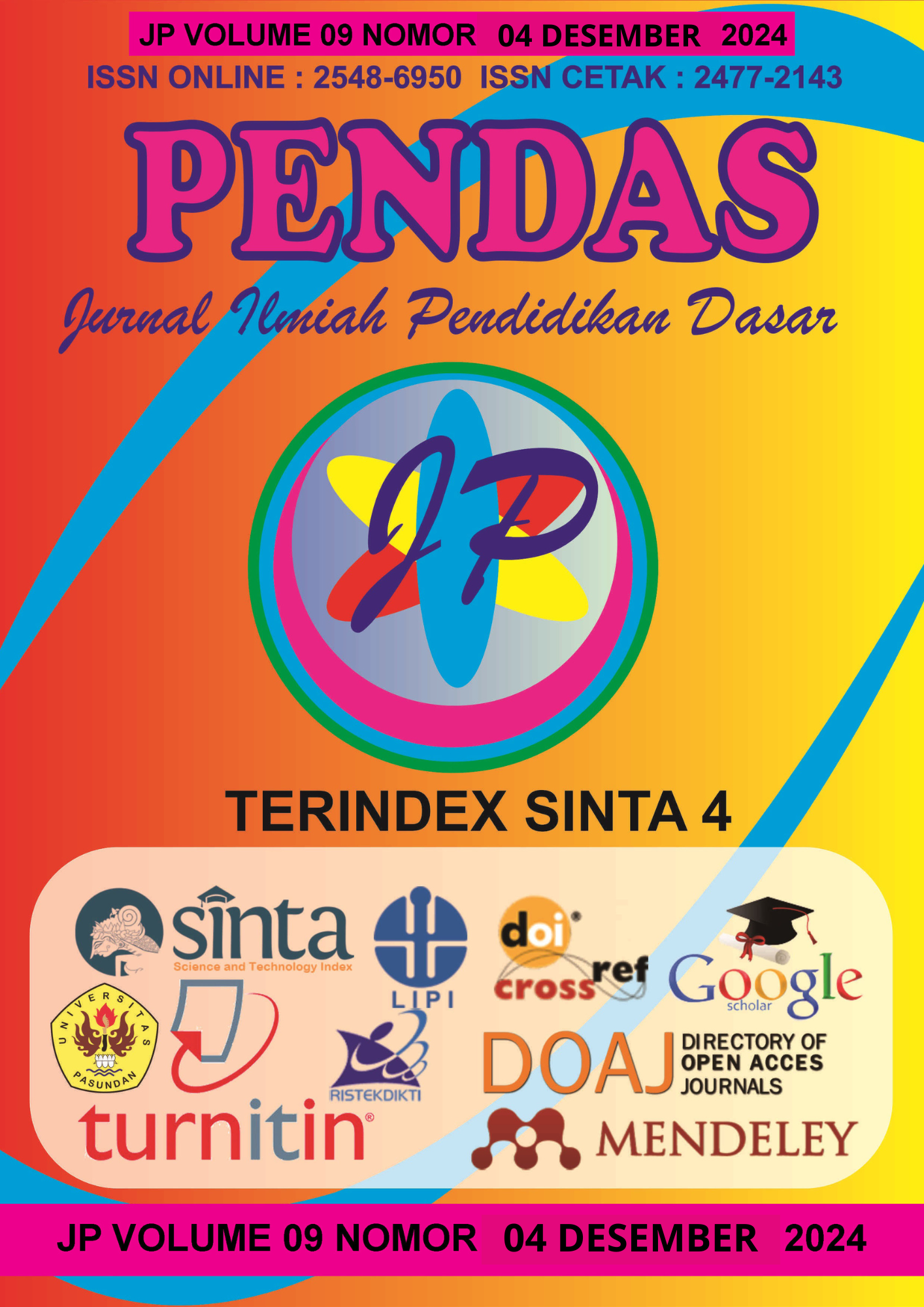PENGARUH KARAKTER POSITIF SISWA TERHADAP HASIL BELAJAR MATEMATIKA PADA MATERI PENGUKURAN LUAS MELALUI PENDEKATAN KONTEKSTUAL TEACHING AND LEARNING
DOI:
https://doi.org/10.23969/jp.v9i04.21700Keywords:
Contextual learning, area measurement, CTL, learning outcomes, learning activitiesAbstract
This research aims to (1) enhancing student,s positive character in Area Meassurement skills (2)white enhance students' skills in measuring area through the contextual teaching and learning approach (CTL), and (3) examine whether the contextual approach to the concept of area can improve students' learning outcomes. The method used is qualitative with a descriptive and inductive analysis approach as explained by Rahmat. The results of the study show that at the initial stage, teachers did not fully understand the CTL approach with an average document analysis score of 2, observations of student learning activities averaged 1.75, and student learning outcomes reached an average of 69, which did not meet the Minimum Completeness Criteria (KKM). After a series of interventions through the application of the CTL approach, the results of teacher document analysis increased to 3.75, observations of student learning activities reached an average of 3.73, and student learning outcomes increased significantly with an average of 87. This increase indicates that the CTL approach is effective in improving teacher understanding, student learning activity, and student learning outcomes on the concept of area measurement. With the achievement of significant improvement, this study was stopped at this stage.
Downloads
References
Bernard, R. M., et al. (2004). How Does Distance Education Compare With Classroom Instruction? A Meta-Analysis of the Empirical Literature. Review of Educational Research.
Dewey, J. (1938). Experience and Education. Touchstone Press.
Fraser, B. J., et al. (1990). Classroom Environment Instruments: Development,
Johnson, E. B. (2002). Contextual Teaching and Learning: What It Is and Why It’s Here to Stay. Corwin Press.
Lestari, R. (2020). Karakter Positif Siswa dalam Pembelajaran Kontekstual. Jurnal Pendidikan Dasar Indonesia download.garuda.kemdikbud.go
Masyita Nur Syam. (2020). Pengaruh Pendekatan Kontekstual terhadap Hasil Belajar Matematika Ditinjau dari Kebiasaan Belajar Siswa Kelas VIII. UIN Alauddin Makassar. repositori.uin-alauddin.ac
Riyanti et al. (2013). Pengaruh Metode Kontekstual pada Pembelajaran Matematika di SD. FKIP Universitas Tanjungpura jurnal.unigal.ac
Meilani et al. (2023). Penerapan Pendekatan Kontekstual untuk Mempermudah Pemahaman Siswa dalam Matematika. Jurnal Tambusai Pendidikan jurnal.unigal.ac
Widodo & Mawardi. (2022). Peningkatan Hasil Belajar Matematika Melalui Pendekatan Kontekstual. Jurnal Ilmiah Wahana Pendidikan jurnal.unigal.ac
Hasanah, S. (2021). Hubungan Antara Motivasi Belajar dan Pendekatan Kontekstual pada Pembelajaran Matematika. Jurnal Pendidikan Dasar Nusantara repositori.uin-alauddin.ac
Nasution, E. (2020). Implementasi Pendekatan Kontekstual dalam Pengukuran Luas pada Pembelajaran SD. Jurnal Pendidikan Matematika Indonesia repositori.uin-alauddin.ac
Rusdiana et al. (2021). Efektivitas CTL dalam Pembelajaran Matematika di SMP. Seminar Nasional Pendidikan Matematika, Universitas Galuh jurnal.unigal.ac
Vygotsky, L. S. (1978). Mind in Society: The Development of Higher Psychological Processes. Harvard University Press.
Wahyuni et al. (2023). Pengaruh CTL terhadap Pemahaman Konsep Matematika Siswa Kelas IV. Jurnal Edukasi Matematika Indonesia download.garuda.kemdikbud.go
Yusuf, H. (2023). Peningkatan Kemampuan Matematika melalui Metode Kontekstual. Seminar Nasional Pendidikan Matematika Universitas Negeri Jakarta download.garuda.kemdikbud.go
Downloads
Published
Issue
Section
License
Copyright (c) 2025 Pendas : Jurnal Ilmiah Pendidikan Dasar

This work is licensed under a Creative Commons Attribution 4.0 International License.



















